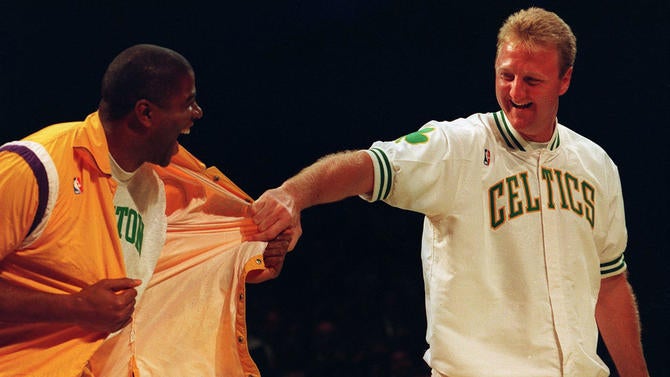In 2015, the NBA made a relatively quiet change to its playoff structure, eliminating the automatic top-four seed for all division winners. The logic was, and remains, as sound as it is simple: Rewarding a lesser team for playing in a weaker division makes no sense. Why would rewarding a team from a lesser conference, or penalizing a team from a tougher conference for that matter, be any different?
The idea of going to a straight 1-16 playoff seeding, regardless of conference, has been a hot-button topic among new-age fans for a while, if a back-burner one for the league. But it's moving to the forefront. Commissioner Adam Silver has addressed the possibility with increasing regularity, and urgency, of late. On Saturday, the Celtics and the Rockets gave us a thrilling glimpse into what a wide-open playoff bracket could look like with arguably the best game of the season.
A few more games like that in a potential semifinal matchup between these two teams, and ratings -- which, let's be honest, are what really drive the league's actions -- would launch into orbit. Indeed, there's a good chance this would happen. Entering Monday, if the playoffs were in fact to be seeded 1-16, Houston, as the No. 1 overall seed, and the Celtics, as No. 4 overall, would be on track to match up in the semifinals if seeds held. Golden State would then play the Raptors in the 2-3, and we would be on track for a Rockets-Warriors Finals.
"I've been saying this for like 10 years, man," two-time NBA champion and current TNT analyst Kenny Smith told CBS Sports at All-Star weekend. "NBA fans don't care [about conferences]. They want to see the best two teams playing in the Finals."
You can't argue this. There isn't a basketball fan on earth that doesn't want to see the best two teams going at it for the title. That's the purest part of sports. Now, you could say that in Cleveland and Golden State, we've gotten the best two teams in the Finals the last three years. You could even argue this is the case most years. What you can't argue is that the respective playoff roads traveled to get to that point have been anywhere near equal for close to 20 years.
With few exceptions, the West has been the collectively superior conference dating back as far as some of these young fans have been alive. Remember that 73-win Warriors team that lost in the Finals in 2016? It had to go through a seven-game basketball war with Oklahoma City in the conference finals. If the Thunder, who had a 3-1 series lead if you recall, would've gotten past the Warriors, that would've been even more egregious.
To that point, only one team in NBA history -- the 1971-72 Los Angeles Lakers who eliminated Kareem Abdul-Jabbar's Milwaukee Bucks in the conference finals -- had gone through even a single team that had posted a double-digit point differential for the season en route to winning a title. The 2016 Thunder would've had to go through two such teams in one playoff run -- San Antonio in the second round, Golden State in the conference finals -- before then facing the Cavs in the Finals.
It would've been the most difficult playoff run ever.
Such is life in the West.
Meanwhile, the Cavs are a combined 36-5 in the Eastern Conference playoffs over the last three years. Not one team has posed an even halfway realistic threat to them. Naturally, LeBron James, who has reached seven straight Finals by way of the lesser conference, likes things the way they are. From NBA.com:
Commissioner Adam Silver recently floated a proposal where the 16 teams would be seeded regardless of their conference.
James disagrees with the concept, mostly because it "changes the landscape of the history of the game." The three-time champion, who has played in seven straight Finals, noted that there have been junctures where one conference has dominated, but in the long run there has been balance.
"It's cool to mess around with the All-Star Game, we proved you can do that," said James, who picked an All-Star team this year under a new format. "But let's not get too crazy about the playoffs."
Again, it's pretty convenient that James feels this way. Admitting there needs to be change would be an indictment on his reaching those seven straight Finals. That's not a knock on LeBron, who in my opinion is the best player in history. It's just reality. There is no chance he goes to seven straight Finals in the West. Zero. Meanwhile, Chris Paul has been getting killed for years for never having made a conference finals appearance in his career. How many times would those Clippers teams have gone to the conference finals in the East? I'm guessing a few, at least.
As for LeBron's argument that over time there has been balance between the two conferences, again, this has not been the case for a very long time, though he's hardly the only one to suggest as much.
"The current format to me is fine," NBA TV analyst Stu Jackson, who for more than 13 years also served as the NBA's Executive Vice President of Basketball Operations, told CBS Sports. "What happens on an annual basis is when you get these aberrations, or these quirks, whereby you have certain teams from the Eastern Conference that perceptionally aren't as strong as teams in the Western Conference, this conversation begins about reformatting the structure.
"In my personal opinion," Jackson continued, "I think those aberrations are few and far between. I think the strength in each conference can be cyclical."
There's that buzz word: Cyclical. It's thrown around often, and it's a good place to start in examining the three biggest arguments that tend to be put forth in favor of keeping the current playoff structure intact.
The Cyclical Argument
Indeed, people are quick to point out the cyclical thing, saying it'll eventually turn around and the East will be the better conference. But I have to ask: what difference would that make? Don't you then just have the same problem only the reverse? The point is the pendulum almost never balances right in the middle. Change the playoffs to a straight 1-16 format, and you don't ever have to worry about this again.
The Rivalry Argument
Another thing people love to say would be compromised with the elimination of conferences are these "rivalries." For starers, eliminating conferences wouldn't eliminate regional rivalries. The possibility to Philly matching up with Boston, for instance, is still in play. Besides that, aren't we overplaying this rivalry thing?
The new-age fan wants to see the best players going against one another. Players change teams all the time, and the intrigue of the particular matchups they define goes with them. Even from a traditional standpoint, the most storied rivalry in NBA history, Lakers-Celtics, is in fact an inter-conference edition.

Fact is, the numbers don't lie. Per the NBA, three of the six highest-rated games this year have been inter-conference matchups -- two Cavs-Warriors matchups, which brought in just under 15 million combined viewers, and Boston vs. Golden State on Jan. 27, which brought in close to five million. When the numbers come in, don't be surprised if Saturday's Rockets-Celtics battle joins that East-West list.
So, really, it comes down to ...
The Travel Argument
Over the last few years, shrinking the amount of travel in the NBA schedule has been a major point of emphasis with the league. Stretches of four games in five nights have been entirely eliminated, and back-to-back dates have been reduced considerably. This is a good thing. The league has become much smarter about saving players' bodies when and where it can, and you can understand the hesitance in undoing that progress by turning around and increasing the travel toll come playoff time by eliminating conferences, and thus opening up the possibility for opposite-coast first-round series. From Silver:
I've said in the past, the obstacle is travel, and it's not tradition in my mind, at least. It's that as we've added an extra week to the regular season, as we've tried to reduce the number of back-to-backs, that we are concerned about teams crisscrossing the country in the first round, for example. We are just concerned about the overall travel that we would have in the top 16 teams.
Again, this is understandable. That's a lot of time in an airplane at the end of an already exhausting NBA season. That said, as Kenny Smith pointed out, "this whole thing started back when there were no chartered flights." Indeed, these days teams aren't exactly slumming it through hour-long security lines and squeezing into economy class.
"Listen, making things easy for these guys, I'm not a big proponent of," Charles Barkley said at All-Star weekend. "If Bill Russell and Dr. J and those guys can play three games in three nights in the worst tennis shoes ever invented, and fly commercial, or ride a bus, I think these guys can be inconvenienced a couple days a year to make $30 million and ride on a private jet."
There are a lot of people who work for a living who would side with Barkley here, but here's the thing: There is a pretty easy way to solve this. You just go back to a 2-3-2 series format rather than the 2-2-1-1-1 format in place today. This would mean a series could only switch venues three times at most, whereas under the current format, if a series goes the full seven games, it will switch venues five times.

What does that look like from a miles-traveled standpoint? Under the current format, a Portland-Memphis series would represent the most potential miles traveled. If that series went seven, the lower-seeded team would travel 11,220 miles. Now, if you eliminate conferences, the most extreme matchup from a miles-traveled standpoint would be Portland vs. Miami. If you played that series under a 2-3-2 format, and it went seven games, the lower-seeded team would travel 9,765 miles.
In other words, the NBA could seed the playoffs 1-16, and with a simple tweak to the individual series format, actually REDUCE the amount of travel required of teams. This isn't a perfect solution, mind you. The higher-seeded team, for instance, could lose out on a home game, and the money that game would generate, if it won a series in five games, as Game 5 would be on the road rather than back home as it would be under current rules. But come on, man. These teams are worth billions these days. We're going to hold up moving the game forward in a meaningful way so a team can sell one more game's worth of tickets and hot dogs?
The travel problem is real.
But it can be solved.
So, will this actually happen?
In short, yes. It might take a while, but there's too much momentum starting to gather behind the idea. Opening up the possibility for fresh, new matchups throughout every round of the playoffs, in addition to paving the way for the ultimate goal of pitting the two best teams against one another for the title, is too potentially fruitful to turn away. Plus, it's just the right thing to do from a competitive balance standpoint.
Now, we have to point out that to make this thing completely equitable, you can't just change the playoff structure; you have to change the regular-season schedule, too. Right now, teams play three or four games against each team in their own conference, and two games against the opposite. The Timberwolves, for instance, have to play the Warriors and Rockets a combined seven times this year. The Cavs only have to play them four. It's not exactly fair to seed teams 1-16 when half those teams had a considerably easier path to earning those seeds.
The feeling around the league is there will eventually be one, if not two more teams added by way of expansion, with Seattle being one of the obvious new locales. If, and when, this happens, the league would be able to reduce the regular-season schedule for each team -- perhaps putting one inter-conference game with each team -- without compromising revenue because of the extra total games coming from two more teams. This would be the perfect solution.
Until then, let's not let perfect get in the way of progress. My man Matt Moore told me that when we went back and forth about this topic for months, and it's absolutely true. Of the four major American sports, the NBA is by far the most progressive league. It has changed its lottery structure to de-incetivize tanking. It changed its All-Star Game selection process and removed conference affiliation because the whole thing had turned into a circus. As mentioned earlier, it stopped the practice of rewarding teams with automatic home-court advantage in the playoffs for winning weaker divisions.
From marketing on a global scale to social media savvy to embracing, and encouraging, more socially aware and involved athletes, the NBA gets it, plain and simple. This constant emphasis on remaining in touch with its fans, on moving forward rather than staying glued to traditions, this willingness to examine and address the dated aspects of its game -- both in the way it's played and the way it's viewed -- is the reason the game continues to grow at a rate Major League Baseball and the NFL could only dream about.
The playoff structure is next.
It's going to change.
And it can't happen soon enough.
![[object Object] Logo](https://sportshub.cbsistatic.com/i/2020/04/22/e9ceb731-8b3f-4c60-98fe-090ab66a2997/screen-shot-2020-04-22-at-11-04-56-am.png)


















